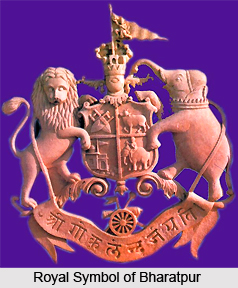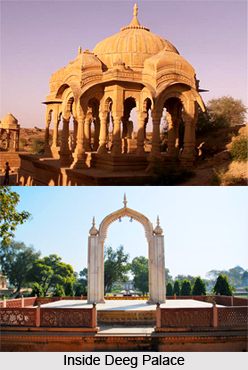 Jawahar Singh, the brave Jat ruler, was the son of Suraj Mai who inherited his legacy. Although Suraj Mai favoured his youngest son, Nahar Singh, to ascend the throne but Jawahar Singh refused to let the constitutionally weak prince to take charge of Bharatpur in Rajasthan.
Jawahar Singh, the brave Jat ruler, was the son of Suraj Mai who inherited his legacy. Although Suraj Mai favoured his youngest son, Nahar Singh, to ascend the throne but Jawahar Singh refused to let the constitutionally weak prince to take charge of Bharatpur in Rajasthan.
The wealth reserve, both inherited and acquired by Jawahar Singh comprised an exorbitant amount of money of rupees ten crore with most of it being buried underground. Suraj Mai was the owner of a spacious kingdom of Bharatpur which was well-cultivated, peaceful, and free from the danger of being easily captured. He had a rich and overflowing treasury and had at his command the most formidable and gallant troops unrivalled in Hindustan. Apart from these Suraj Mai left to his successor fifteen thousand cavalry, twenty five thousand infantry (apart from his fort garrisons), three hundred pieces of cannon of all kinds, five thousand spare horses, sixty elephants, and weapons in proportion.
After the death of Suraj Mai, the tribal elders met together to decide the succession and chose Nahar Singh, the youngest son of Suraj Mai as the chosen heir of the late king and demanded to be recognised at once. They disliked Jawahar Singh for his fiery temper and want of self control. But one bold and well-judged stroke of Jawahar`s strategy brought about a dramatic transformation in the situation. Rebuking his brother he said that he would alone go and avenge the death of his father and think of the succession later. This reproach at one blow unsettled the conspirators. The timid and cowardly Nahar Singh fled with his family and personal treasures. Jawahar Singh wanted to take revenge on Najib-ud-daula, the Afghan ruler but none of the chiefs supported his decision because he needed an enormous sum of money for the expedition. But Jawahar Singh was backed by Rani Kishori who provided him with the resource.

Taking help from the Maratha army under Malhar Rao Holker, Jawahar Singh bombarded Delhi until the city surrendered. But he was baffled by his faithless ally Malhar Rao, who spoilt the affair by showing open partiality for Najib -ud-daula. Later when Malhar Rao Holker aided Bharatpur prince Nahar Singh to capture the fort of Dholpur, Jawahar Singh summoned his brethren of Punjab the Jat Sikhs, to his aid. With his combined forces the daredevil Jat Raja carried war into the enemy camp and in December 1765 Dholpur fell into the hands of Jawahar Singh. The unrealized dream of Suraj Mai, namely to build up a great Jat confederacy extending from the Chambal to the Ravi river dominating the whole of Northern India appeared to be fulfilled with the establishment of intimate relations between Jawahar Singh and the Sikhs.
Jawahar Singh`s venture led him further towards south and the southeast to Dholpur. In the rainy season of 1767 he seized all the dominions of Marathas and other zamindars as far as Kalpi. The countries of Bhind and Atter fell into the hands of the mighty Jawahar Singh. Jawahar established his rule in the Kalpi district, levied tribute on Datia and Seondha, and advanced upto the bridge of Narwar. The Bharatpur state`s geographical area had reached its zenith after inclusion of northern Malwa.
By the end of 1767 AD there was only one power in Hindustan with a well-organised government and a powerful army namely the Jats of Bharatpur. Though Jawahar Singh faced reverses in Rajputana but with great rapidity he mastered a distressed circumstance and brought it back to normalcy. He maintained his usual vigour and tenacity. He threw himself heart and soul into reorganizing his army, and particularly increasing the European corps and the field artillery. His authority was re-established everywhere in his dominion and his name respected and feared abroad. But his stormy career came to an appropriately tragic end, when in July 1768 he was suddenly, cut down by a favourite soldier whom he had once raised extremely high and then disgraced.
Jawahar Singh left behind a numerous and well-disciplined army, commanded by loyal officers. His finances were in the best order and he had political views which appeared very wise to his European military chiefs. Jawahar Singh"s court was splendid and magnificent, the best market in Hindustan for the valour of a soldier, skill of an architect and the pleasing harp on a native bard. With the soldierly qualities and administrative capacity, Jawahar Singh was the unparallel choice to bear the legacy of his legendary father Suraj Mai.






